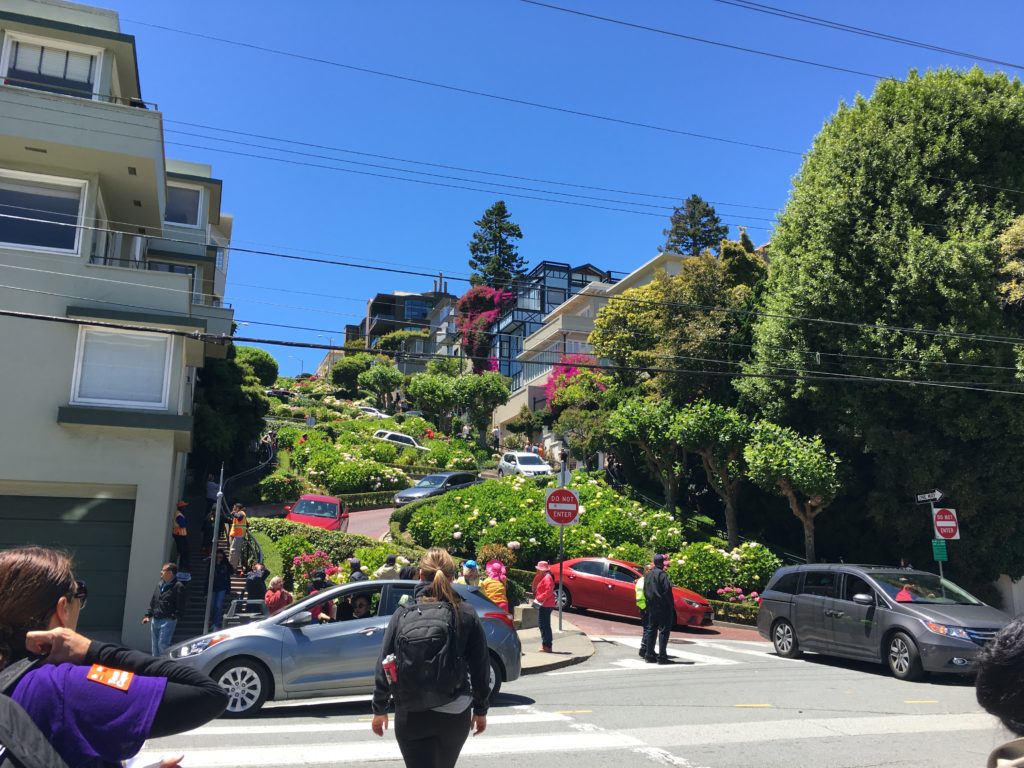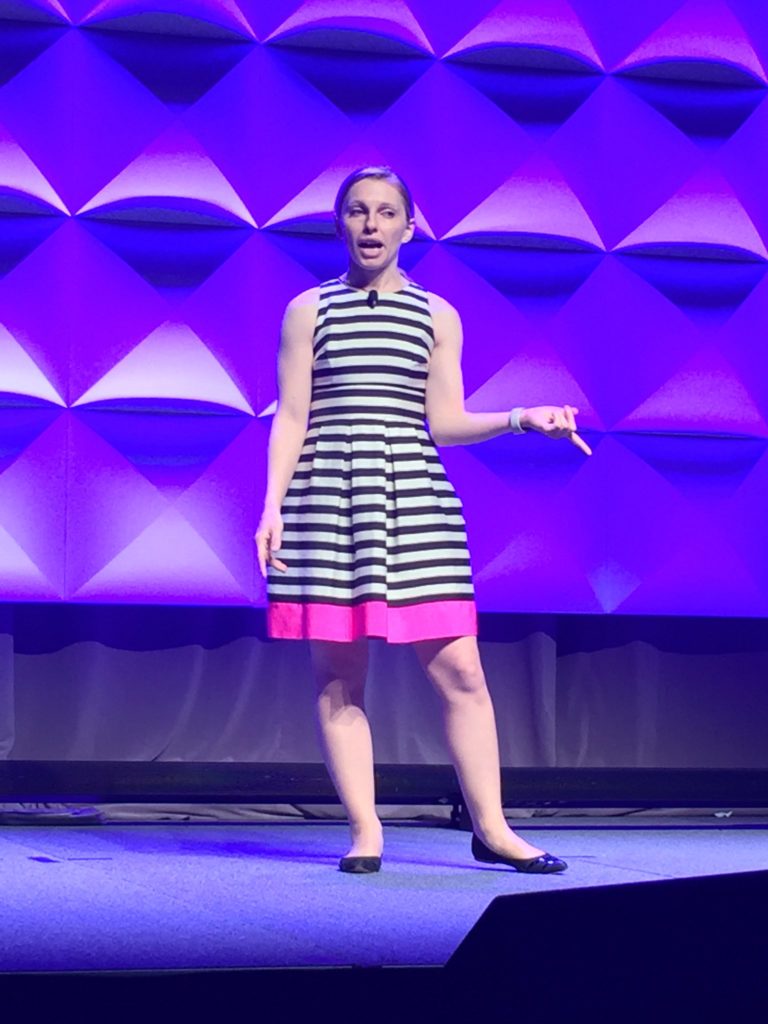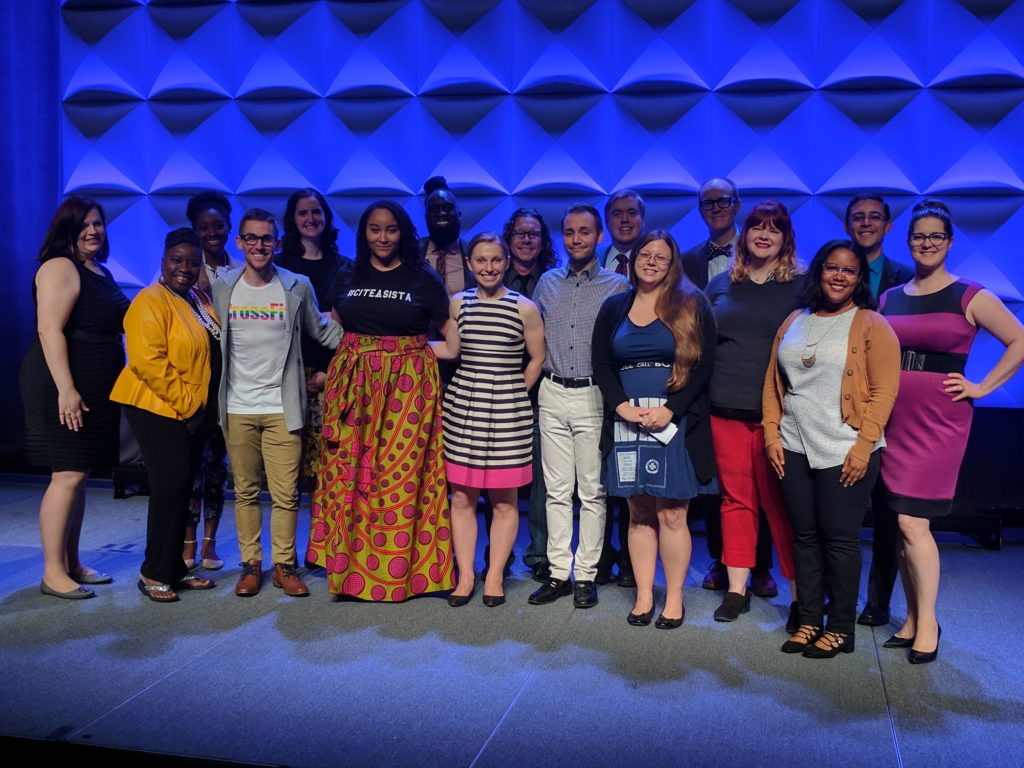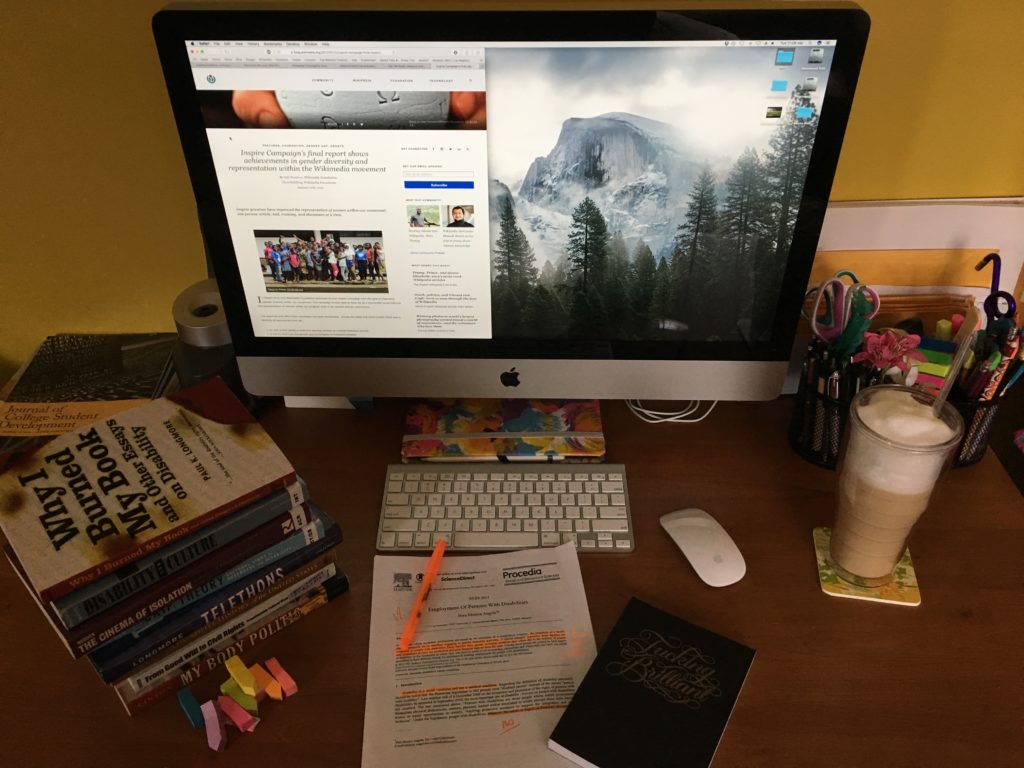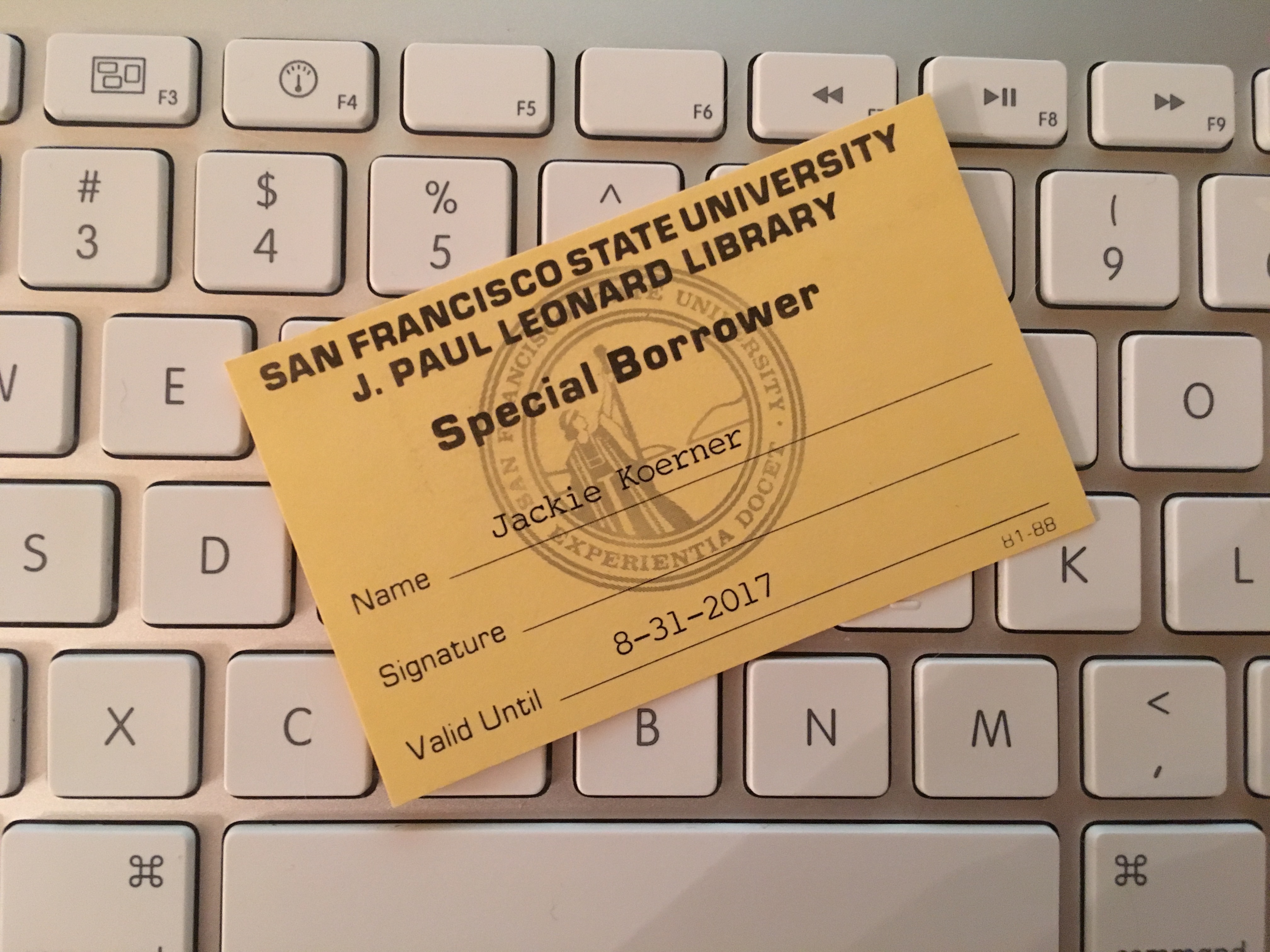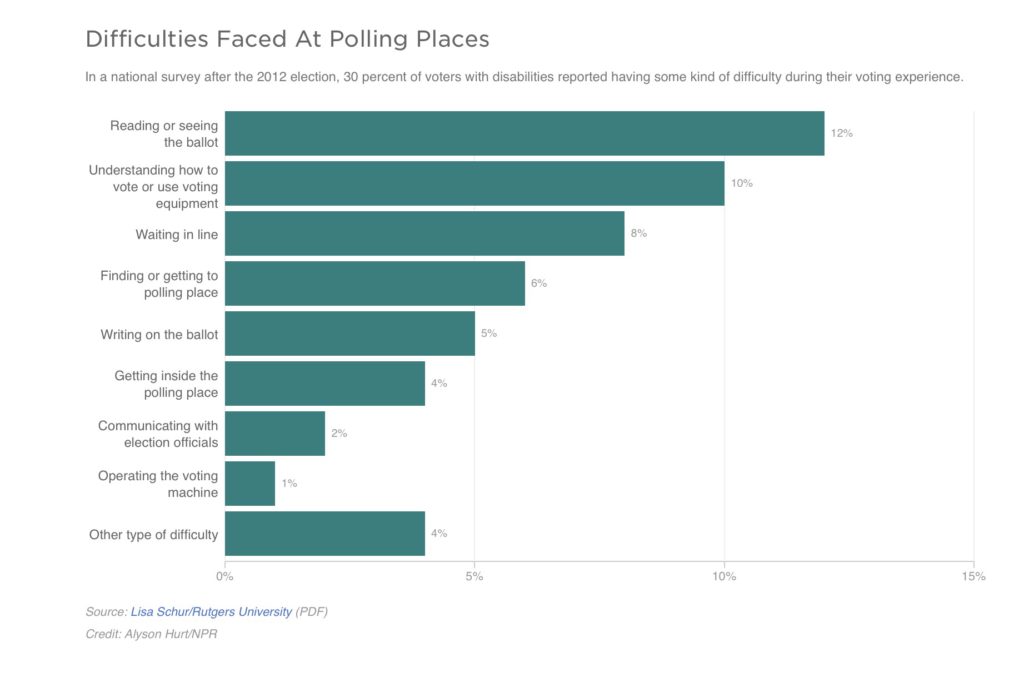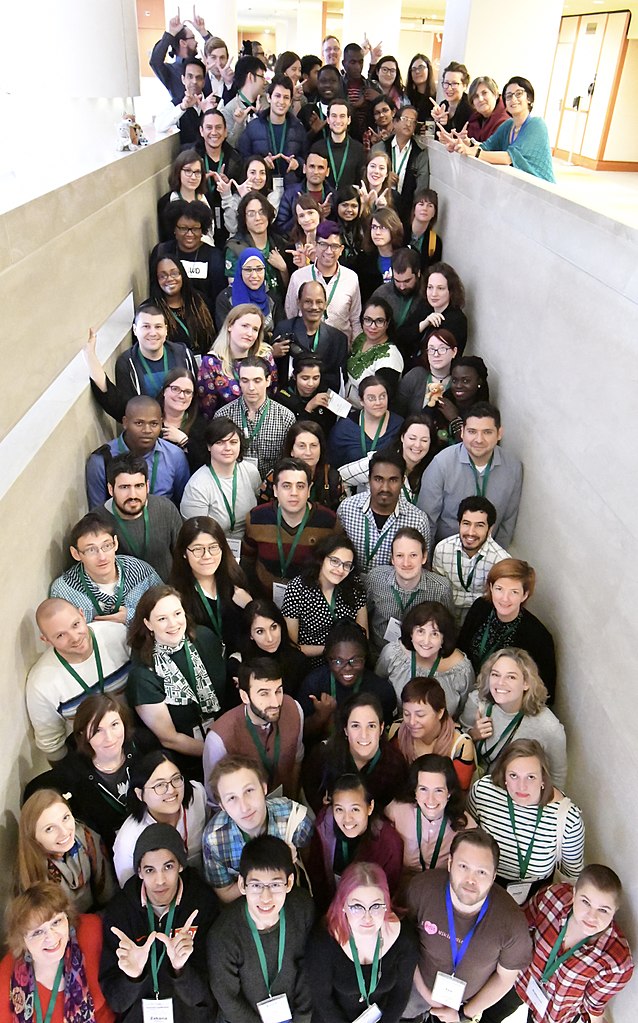
This past weekend I attended the Wikimedia Diversity Conference in Stockholm, Sweden. This conference was hosted by Wikimedia Sverige and was the second conference of its kind. The 80 attendees live in 43 countries and speak a total of 23 various languages. It was humbling to be in such a delegation.
I became interested in attending the conference during Wikimania 2017 in Montréal, Québec. I heard about it from another attendee. The principles of the open knowledge movement speak to my core values: education for all, content created by the masses, and consumed by everyone – for free. Due to my desire for equity in the open knowledge movement, I knew I would really appreciate a conference like this.
Right now, the communities in the open knowledge movement are out of balance. The larger communities, which are connected by language and often geography, dominate the attention and focus of the broader movement. I am not saying one community should be ignored to the detriment of another. I am saying we need to support the developing communities better.
So, going back to August, I read about the conference and signed up to be an ambassador to help spread the word about the conference. I started working on my application. Space was limited, so the organizers were being selective about attendance so we ended up with a well-rounded group from around the world. I applied for a scholarship to attend the conference, and considering I self-funded four trips so far this year on one household income, it was much needed. Unfortunately, in early September, I got notice that I was on a waitlist for the scholarship that would help with travel, lodging, and conference attendance fee. I understood. The response to the conference was overwhelming I am sure!
Moving to the end of September, I was having chats with some gracious Wikimedians about my grant proposal to investigate the impact of implicit bias on Wikipedia. One person asked if I was going to the Wikimedia Diversity Conference. I told her I wasn’t because I was unable to get travel support. She said, “You know, you should really think about going.” Because I respect her a lot, and the rest of the community does as well, I immediately got off the call with her and told my husband the story: about the conference application, not getting a full scholarship, but a partial, how it might fit right in with my grant, and how this person really thinks it’d be a good idea for me to be there.
Without hesitation, he said, “Do it.”
I thought it might be too late. I emailed the people organizing the conference. I explained how I hesitated because I had already self-funded four trips this year, but I would love to accept the scholarship if the opportunity still was open. The organizers expressed regret as the conference was already at capacity. I understood. I hesitated too long.
A month later I get an email on October 25, nine days before the conference. There was a cancellation and I could attend. I really had lost all hope at that point and just thought I would watch the sessions that were recorded. After a very supportive conversation with my husband, I booked my flights and made plans to head to Sweden for a few days of intense conversations.
My flights were uneventful and I slept much of the time. This is always funny since I always load my iPad with articles and movies in case I’m bored. Each flight I woke up as we were touching down in the next city. Since I just packed a carry-on bag, I quickly got off the last plane and went looking for the bus to take me to the Stockholm Central Station. Hilariously enough, ABBA was playing at the airport in Stockholm.
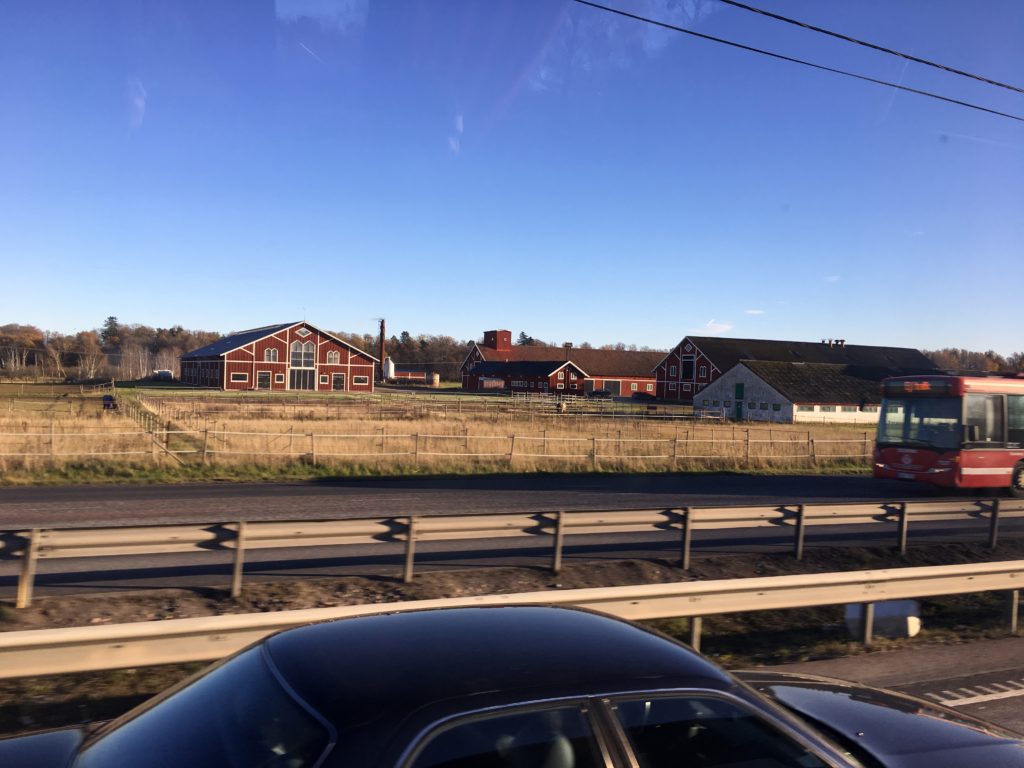
I found the spot where the Flygbussarna busses pick up passengers and got onto a bus right away. The underground was a bit cheaper, but I wanted to see more of Stockholm on my short trip. It was pretty cool – I got to see loads of horse stables, and even the amazing horse stables I saw on the Flygbussarna video, which I would totally live in. I also saw a place where you could buy tiny houses. I didn’t get a picture unfortunately. My oldest wants to be an architect and design tiny houses. She would have flipped out if I got a picture.
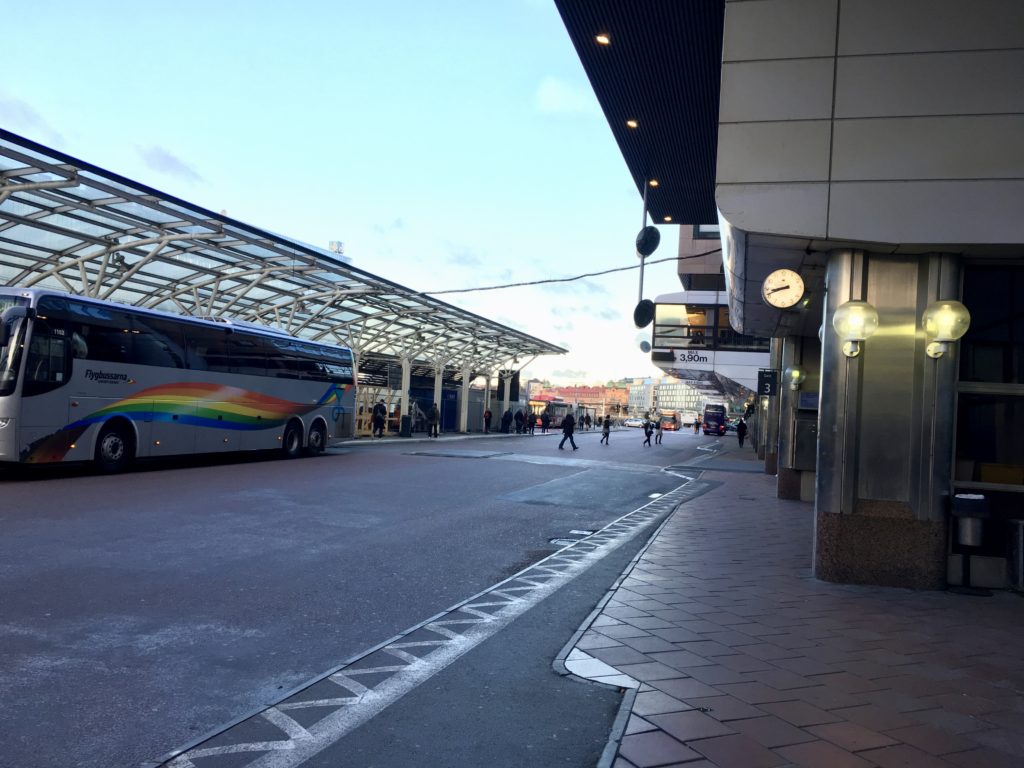
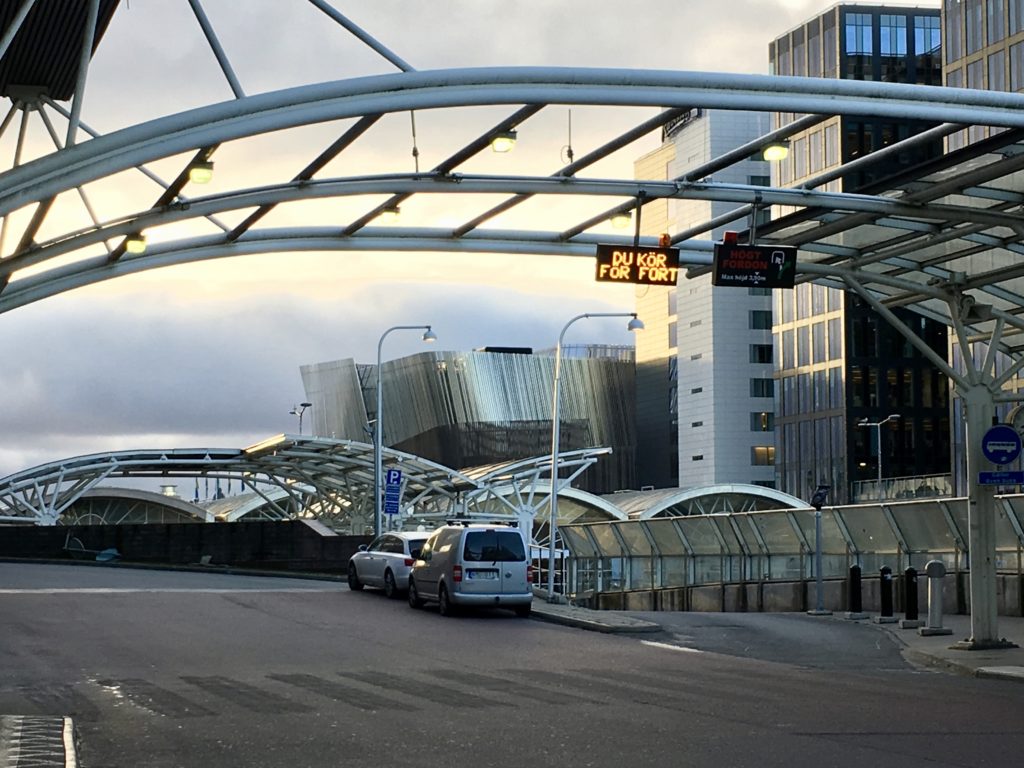
I arrived at the conference hotel just a few hours before the conference was supposed to start. I headed up to my room to freshen up before meeting everyone for dinner. I was excited, but so sleepy. A nice cup of tea helped greatly!
At 4 pm, I headed down to the lobby to meet everyone and walk to dinner. We all walked to the Royal Armoury. It’s a museum, but unfortunately the halls were closed. I really want to go back someday and just enjoy the museums and libraries in Stockholm. Although the halls were closed, I did enjoy the best news: they’re wiki-friendly. They love getting their documents and pictures of their collections on Wikipedia and Commons. It was really cool to hear how they engage with the community and invite Wikipedians to connect with their collections.
Dinner was great – I’d never had vegetarian lasagna with beans before, but it was good, and exactly what I needed after a long day of travel. The conference organizers set us up with bingo cards as conversation starters, but some of us just jumped right into conversation without the cards. We didn’t realize we were supposed to be playing bingo for about 45 minutes! It was so great to see faces new and old – meeting new friends, meeting others again, and meeting some for the first time in person. After a few hours of fun, food, and conversation, I headed back to get a good night’s sleep. I walked back to the hotel with another person focused on the gender gap. We had a good conversation catching up.
When I got back to my room, I found out my roomie was none other than AfroCROWD‘s Sherry Antoine. I met her in Montréal and really enjoyed hearing about her work with her colleagues. I cannot wait to get something like what they are doing going here in St. Louis! They have such a large gathering of folks and with such diverse skills – people good at writing, people good at finding information, young, old, curious, etc. People can learn so much from their wisdom with organizing events and connecting people.
After a good breakfast, Saturday morning the conference started at 9 am. We all organized into “base camps”, which were intended to mix us up into relatively diverse groups. Everyone had to be from a different country, if possible, and a mix of genders and languages as well. We would have discussions where we would move about the room, but then we would come back to our base camp groups to discuss and debrief. The day started with a talk from Katherine Maher, the executive director of the Wikimedia Foundation. In her talk she said:
These conversations are hard. Justice is difficult.
She went on to talk about shared power. Our mission statement implies equity, but it is not our reality. We need to make sure we give people who need to be at the table a seat at the table, and listen. “Nothing about us without us.”
Dominant culture
We need to deconstruct dominant culture. In many discussions on Wiki projects, the edit count is viewed as a measure of a person’s contributions to the movement. This is only a snapshot and a very incorrect view of people’s contributions. Organizing, teaching, advocating, planning, etc. do not produce an edit count. Privilege leads to a high edit count – editing on a computer you own, with electricity and Internet, in a country with free speech – where it’s easier to produce a higher quantity of edits. The edit count is not and should not be considered a representation of a person’s worth in this community.
Cultivating identity
Valuing and realizing the value a diverse group of people and their identities bring to the movement.
Communicating in an accessible language
Speaking in language we understand, and clearly.
Centering the marginalized
Center people who need to be at the table, listen to them, encourage others to listen to them, and be sure to center and share their needs in a way that does not objectify them or their communities.
To close, she said:
Knowledge is a tool of power. Free knowledge is a radical act.
For our next activity, we were to look at our cue card number four. This was about what we wanted to accomplish this weekend. I said:
Listen to the realities of others about their communities and their experiences with their identities in the broader movement.
We discussed these statements in our base camp groups and came up with a few behaviors and actions to make the friendly space policy work:
Listen.
Be curious.
Don’t deny others’ realities.
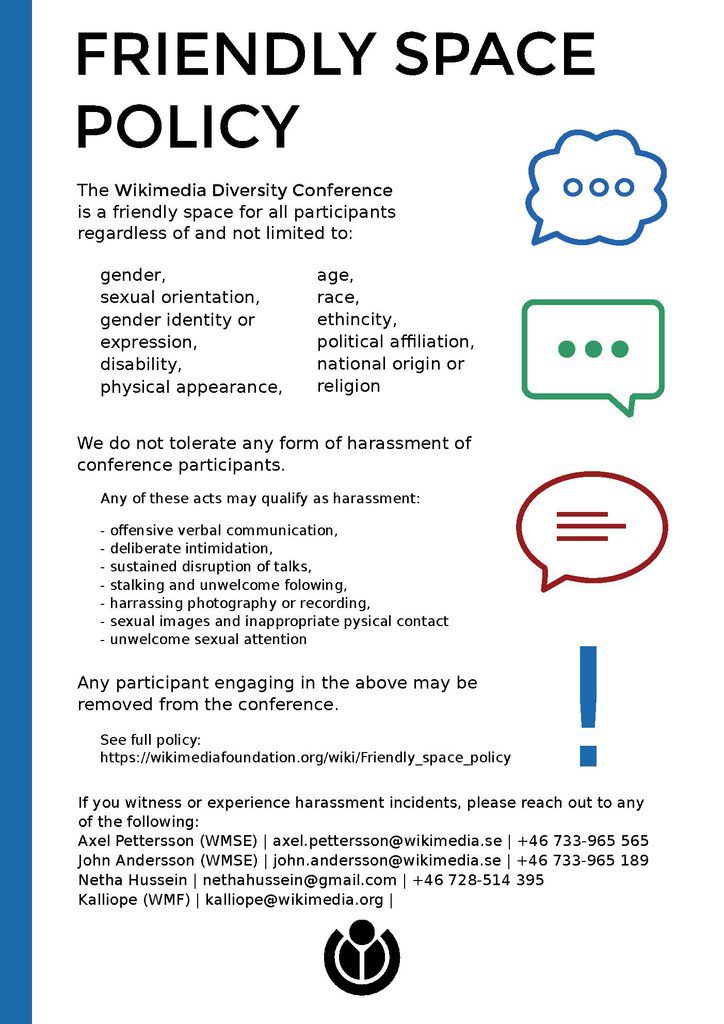
Then Rosie Stephenson-Goodknight presented about the Gender Diversity Mapping Project. A few insights I took away: only 7% of the world’s knowledge is in books. This is huge considering the way notability and verifiability standards for English Wikipedia are centered around published sources. We’re excluding nearly 90% of the world’s knowledge due to policy.
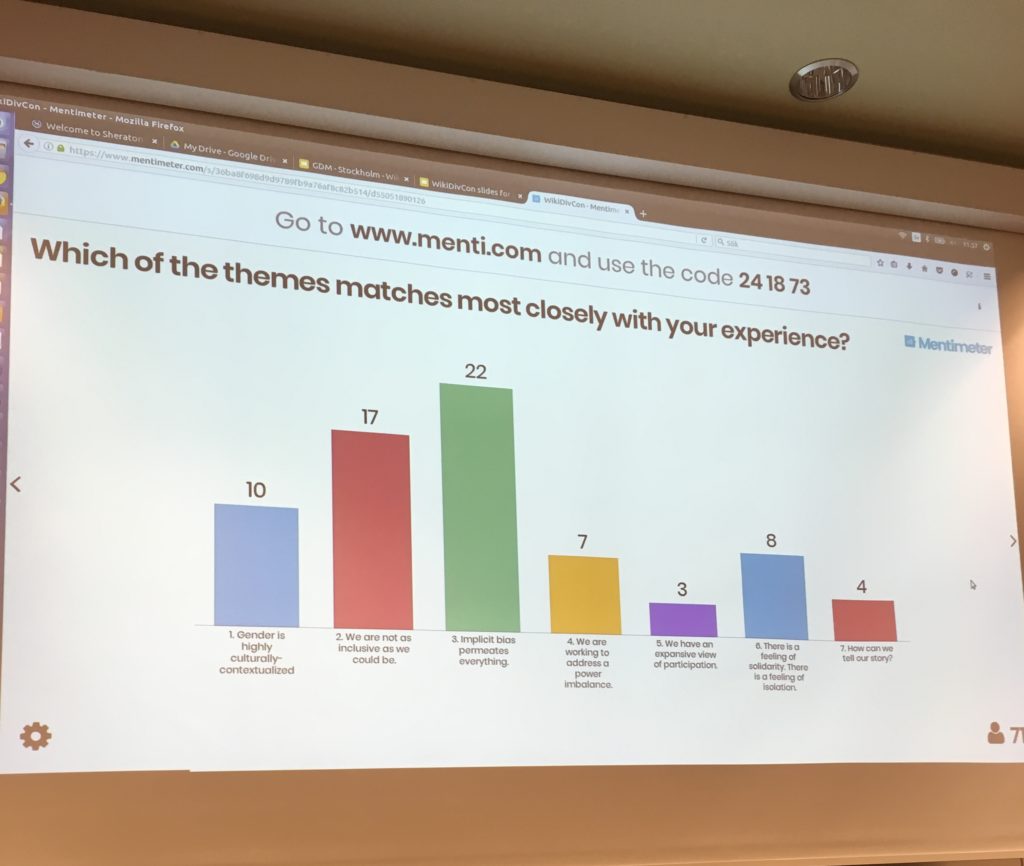
I had a hard time keeping my seat when this menti poll came out the way it did.
Implicit bias permeates everything.
Yes. Bias is a sneaky bitch. Find out more about bias on Wikipedia from my Wikimania 2017 session Birth of Bias: implicit bias’ permanence on Wikipedia and my grant proposal to investigate the impact of implicit bias on Wikipedia.
After an intense morning, we all gathered for lunch. The lunch was great, but not very allergy friendly. Foods were not labeled, so I just ate what I was pretty sure about. Another tip for all future conferences with an international attendance: label foods with information about the food and how one would eat it. It was assumed that everyone knew what each food was and how one would eat it. Not so!
After lunch, it was a discussion about the Wikimedia movement strategic direction. We first gathered in our base camp groups, then mixed around the room. I stayed at our base camp table as a conversation host.
These statements stuck with me the most from these conversations:
“Why does this matter to me?”
“This is something so beyond where we are. We are still struggling with getting the computers and reliable/affordable Internet.”
“This was up for discussion? In our culture, when we see ‘direction’ we think that is what we are doing and there is no discussion.”
“We don’t know how to organize to implement this. We need facilitators to help us with this.”
“What strategic direction? This was not communicated to my community.”
We used Menti a lot to do polls with the whole group, particularly during our discussion about the strategic direction. This allowed us to easily share our ideas and the fruits of our discussions with the bigger group without talking to everyone individually. Here is an example:
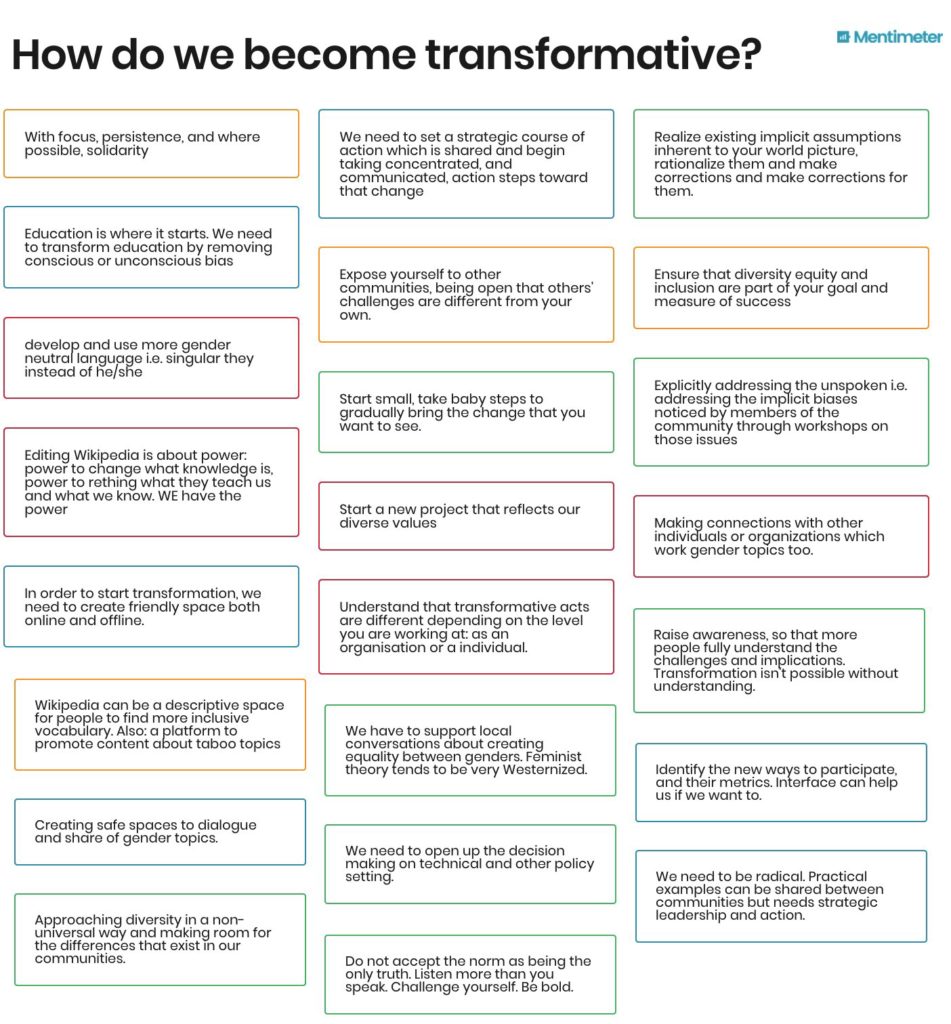 After the session ended for the day on Saturday, I went to walk around the town a bit. It was funny, because we started our days before the sun came up, and ended them after the sun had set for the day. The only time I saw Stockholm in the daylight was going to and from the airport. I took a few pictures walking around town, up and down Drottningsgatan Street, and in old town Stockholm.
After the session ended for the day on Saturday, I went to walk around the town a bit. It was funny, because we started our days before the sun came up, and ended them after the sun had set for the day. The only time I saw Stockholm in the daylight was going to and from the airport. I took a few pictures walking around town, up and down Drottningsgatan Street, and in old town Stockholm.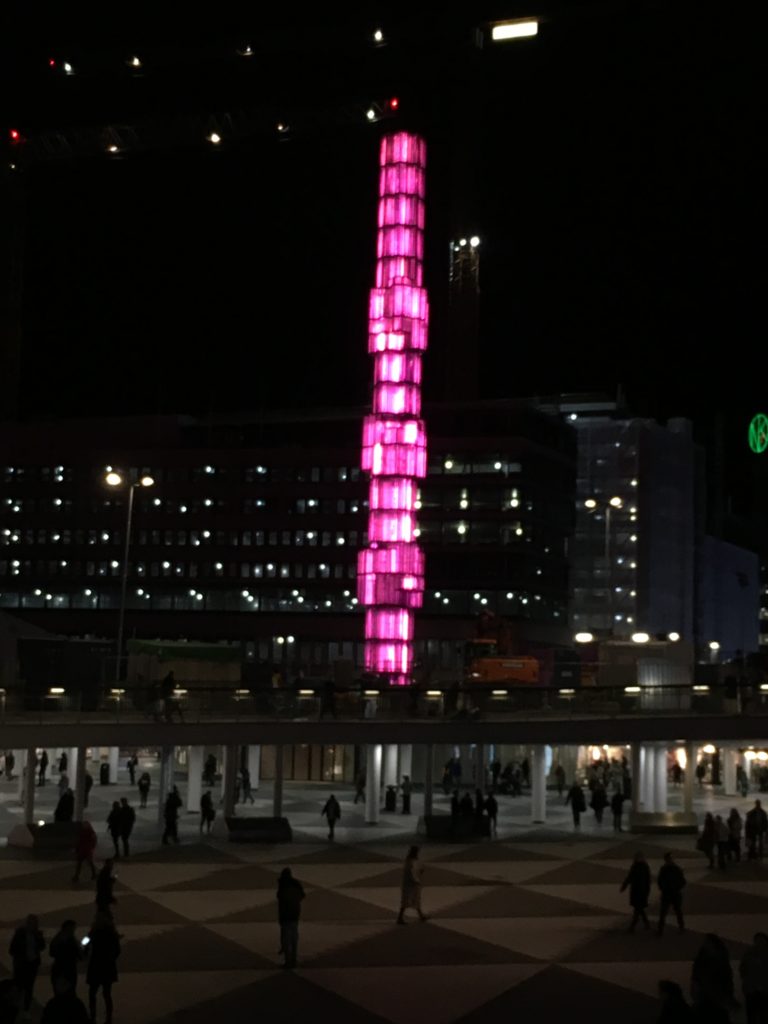
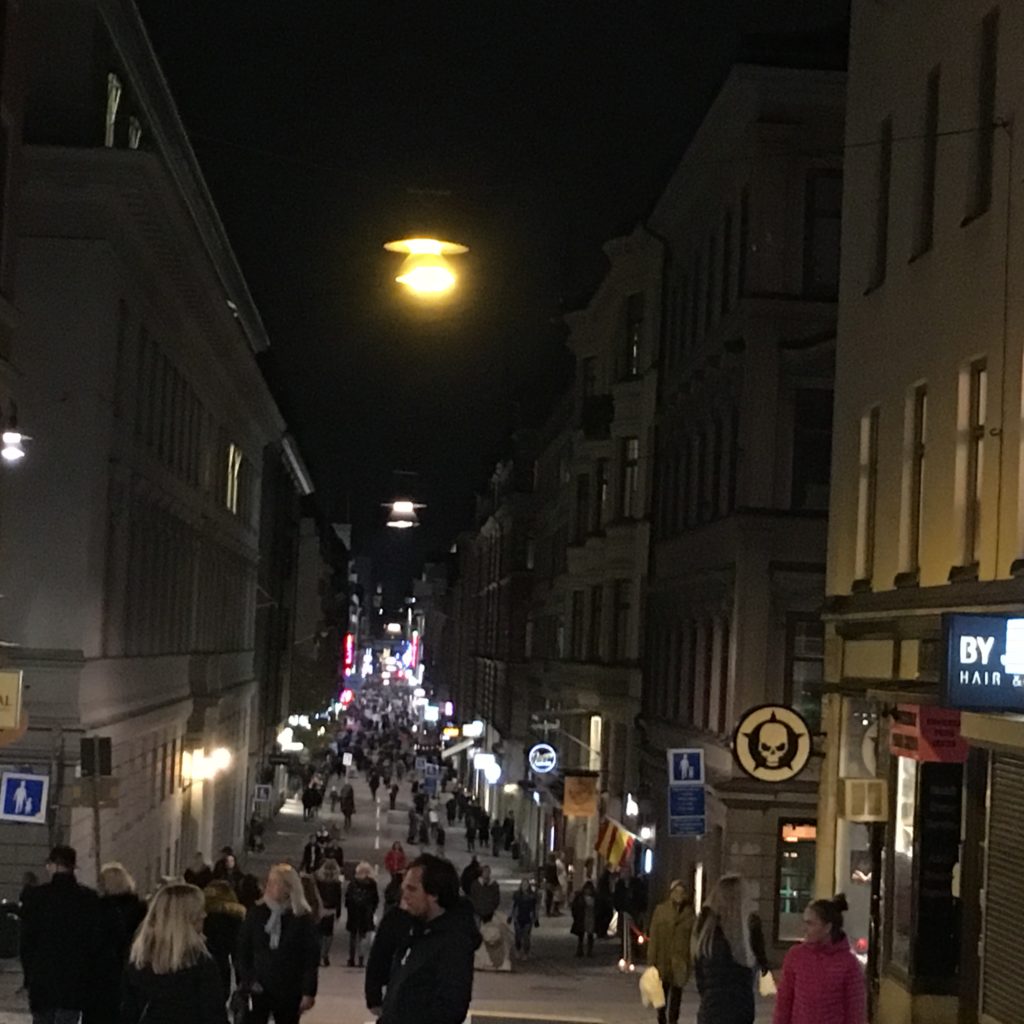
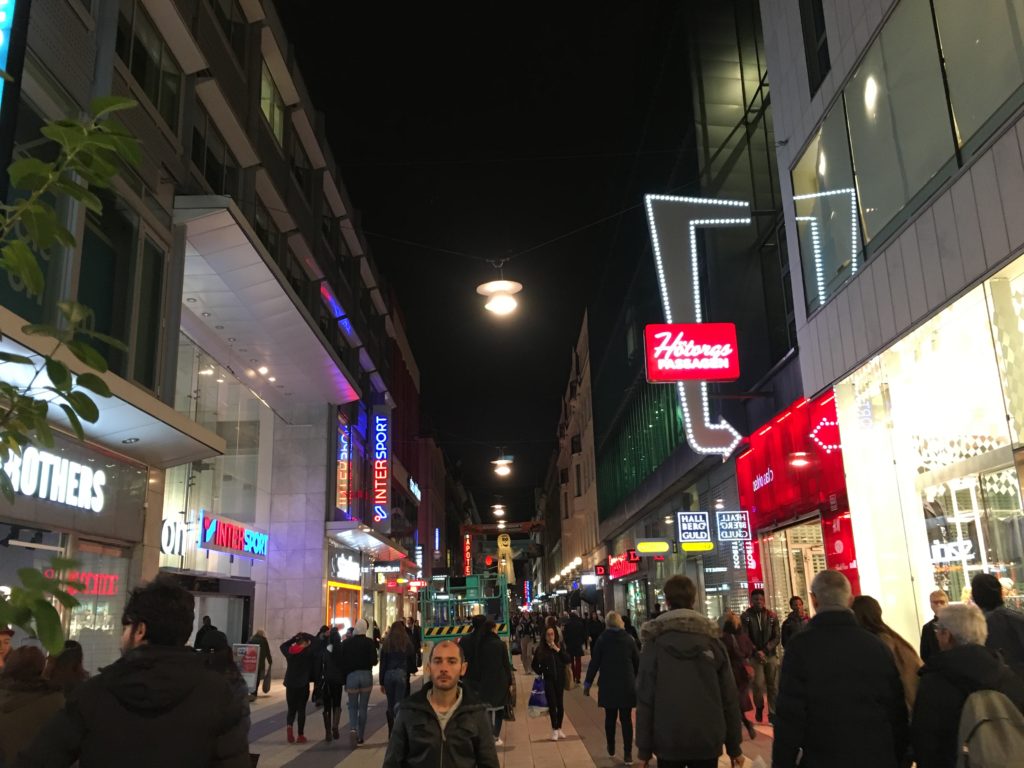
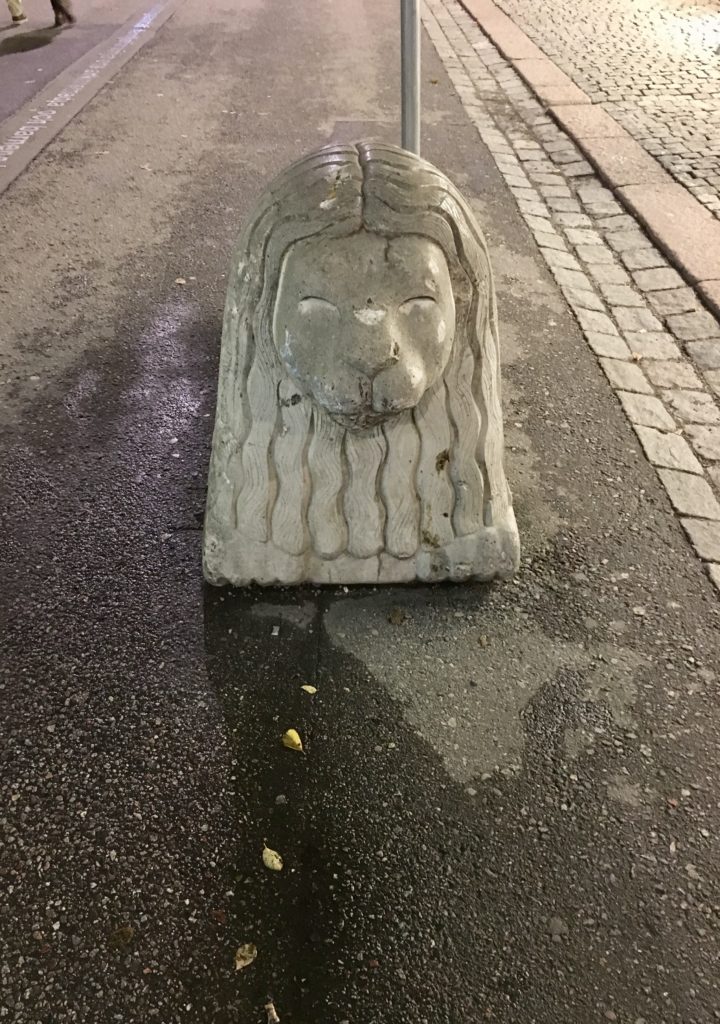 Lions are big around Stockholm. Here is one of the lions on Drottningsgatan Street. These were sculptured by artist Anders Årfelt. Further lions will be placed as barriers for the pedestrian street to help prevent further vehicular attacks, as that has become a common method of terrorist attack in Europe.
Lions are big around Stockholm. Here is one of the lions on Drottningsgatan Street. These were sculptured by artist Anders Årfelt. Further lions will be placed as barriers for the pedestrian street to help prevent further vehicular attacks, as that has become a common method of terrorist attack in Europe.
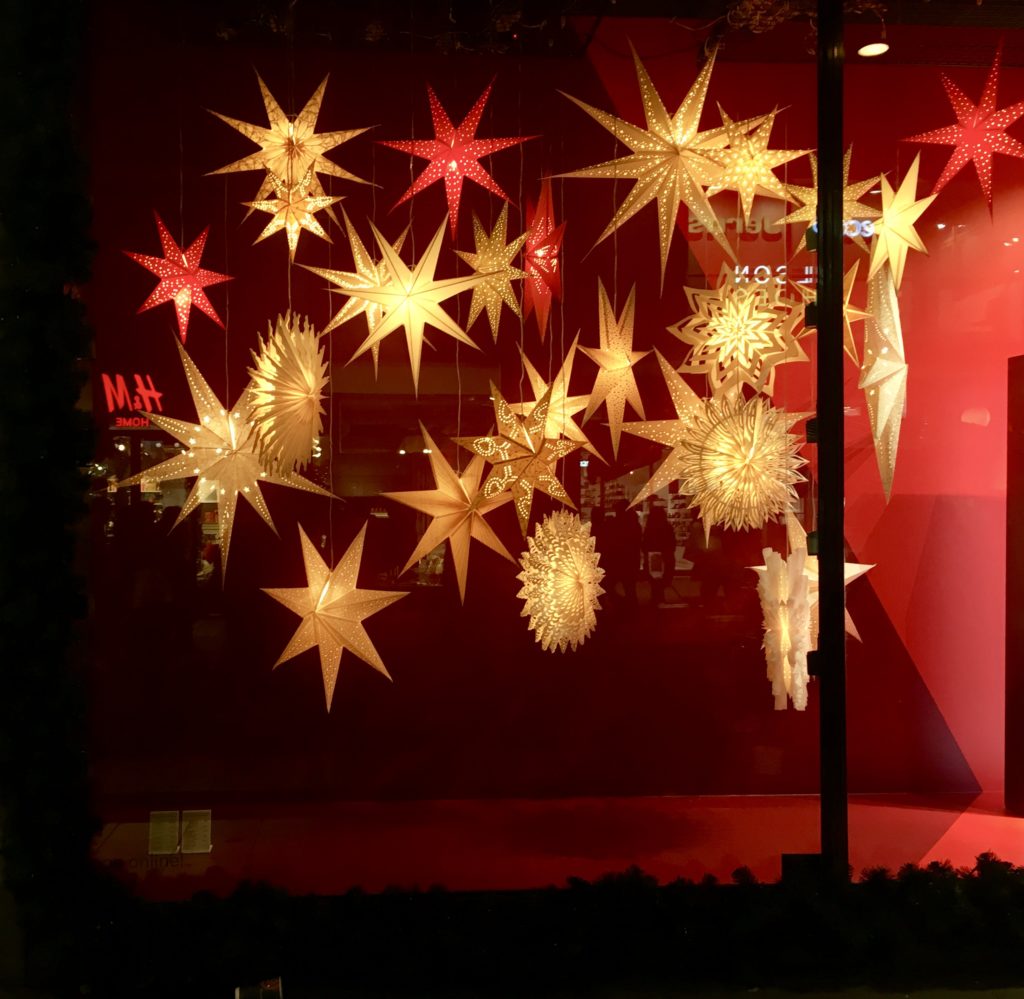 I also got to see the holiday decorations in store fronts around town.
I also got to see the holiday decorations in store fronts around town.
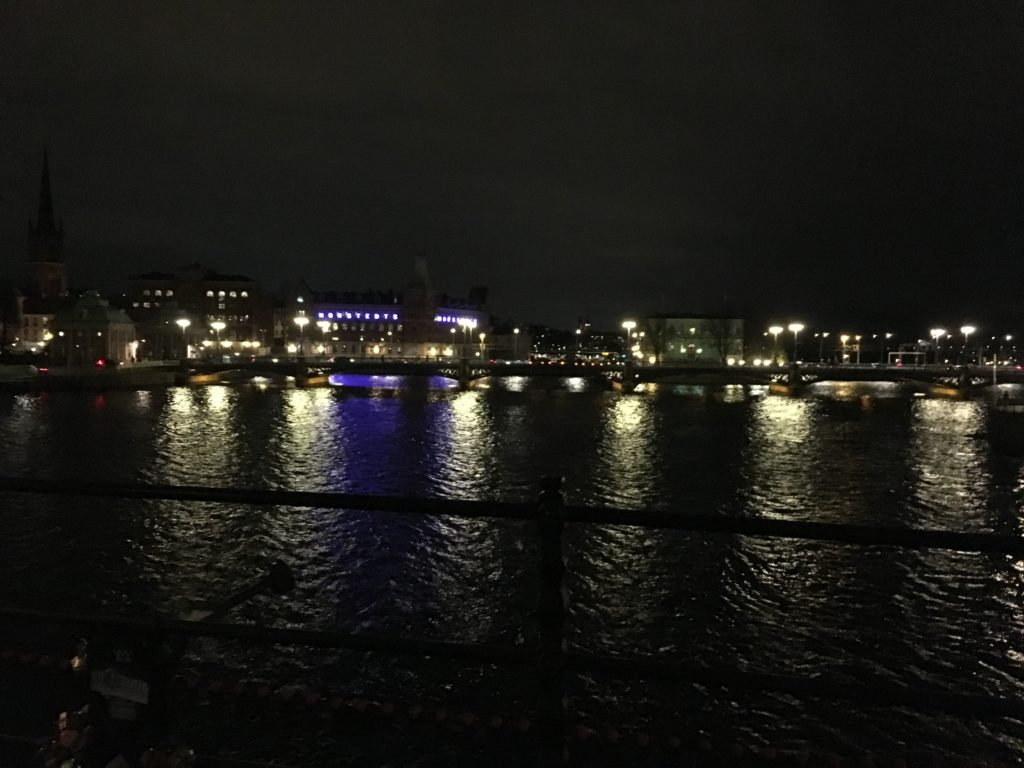
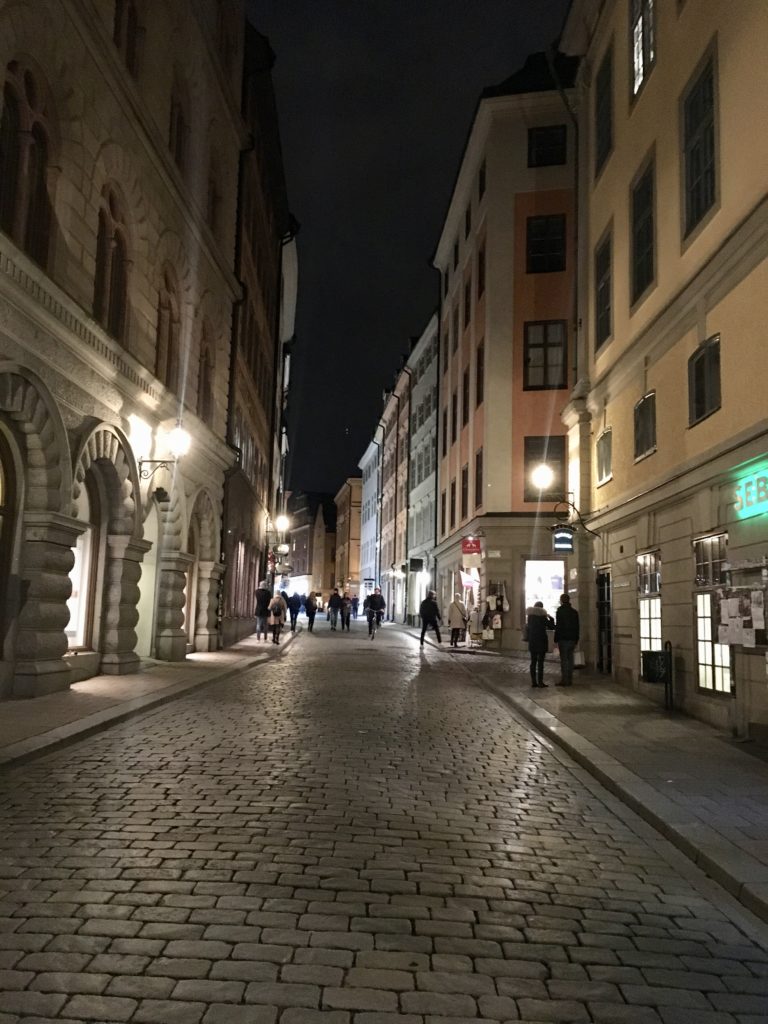
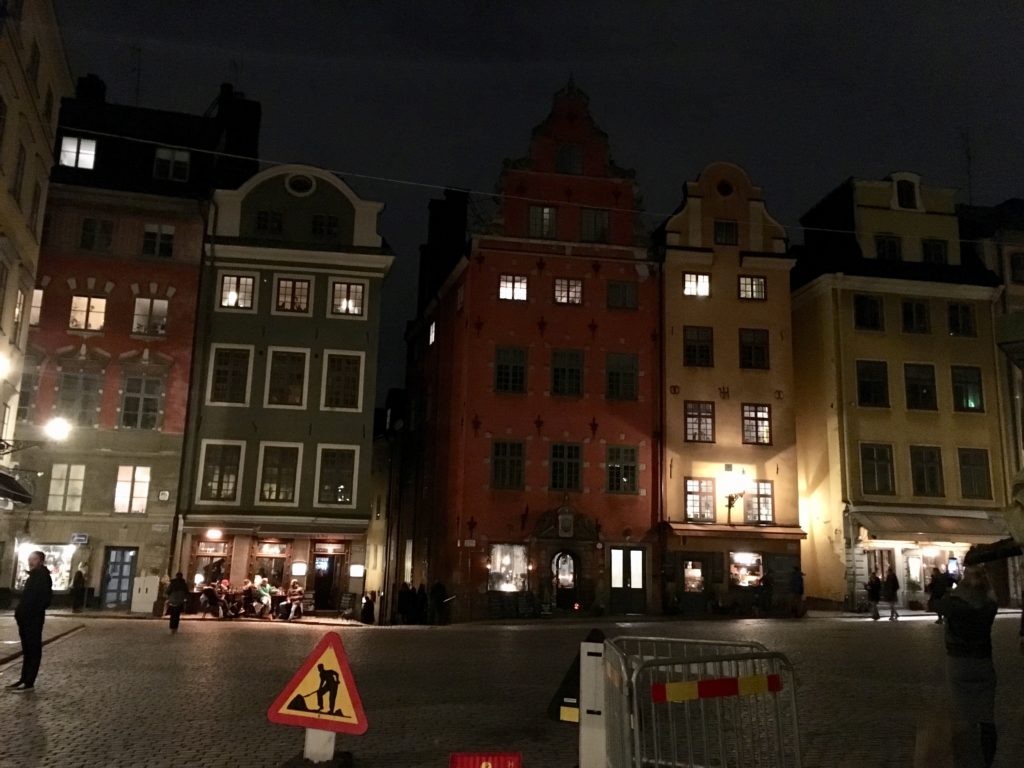
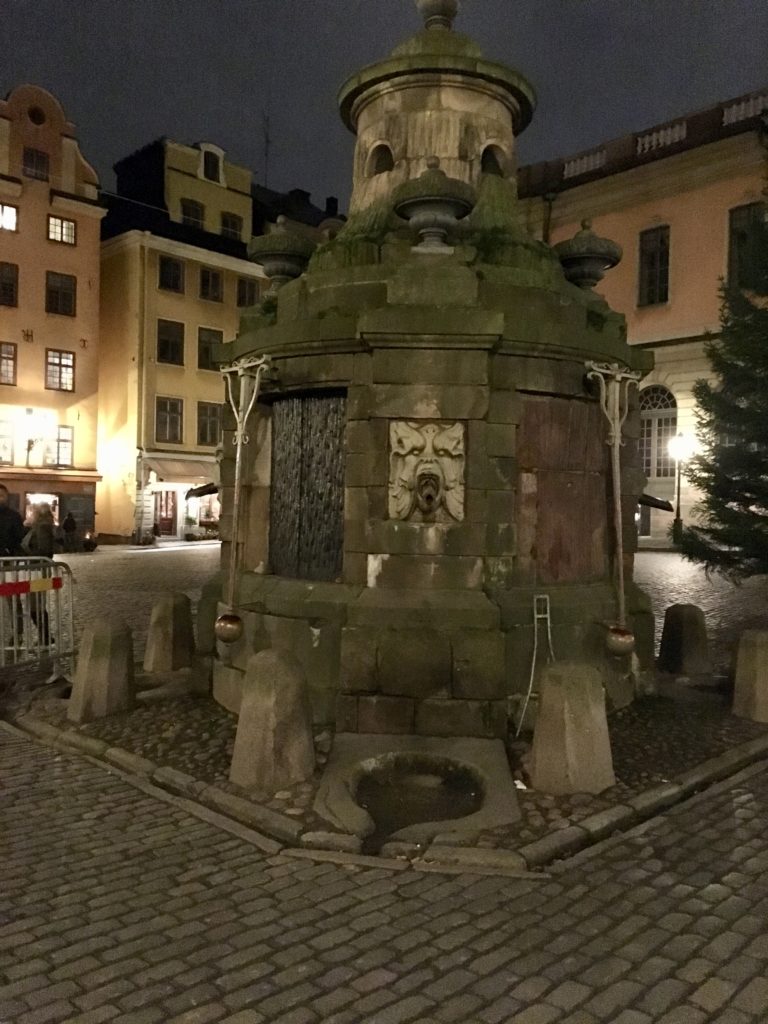 This is a photo of the well on the Big Square. Behind it to the right is the Stock Exchange building, which houses the Nobel Library and Museum.
This is a photo of the well on the Big Square. Behind it to the right is the Stock Exchange building, which houses the Nobel Library and Museum.
During my photo walk I bumped into loads of people from the conference. One of my gender gap partners-in-crime and I bumped into each other. We ended up walking around taking photos and chatting before dinner. It was a well-deserved chat. In this work, it can be hard, and it’s always nice to have someone with whom you can vent!
After enjoying the brisk air, we went back to the hotel for dinner. It was a nice well-deserved break after a long day of deep conversations. More on that later.
The next day, we reviewed day one with our base camp groups, listened to lightning talks, and tried to listen to a presentation about Hosting Inclusive Events. I do feel bad for the person hosting the presentation, who was from the Wikimedia Foundation’s Support and Safety team. She received a lot of anger and critique due to history of harassment not being addressed in the community.
On Harassment
Here is what I am going to say and summarize the harassment dialogue from the conference. Although it was not an official topic, it was a topic that dominated dialogue in my base camp group the entire weekend. One person felt the Wikimedia Foundation did not do enough to represent her in her lawsuit with her harasser. Others do not like the idea of having other people report the harassment they witness, for fear it might become problematic for the victim. Others still thought putting the responsibility on the victim to report the harassment was inappropriate. Basically, it’s complicated, but here are several key things the WMF could do:
- Define what harassment is. There is real confusion about what harassment is and what it isn’t.
- Respond to the harassment in the space where it happens. Don’t wait until after the event. Address the behavior where it is occurring.
- Openly publish the actions victims and the rest of the community can expect from the WMF.
- Relatedly, openly publish the actions victims and the rest of the community cannot expect from the WMF.
- Follow up and follow through.
- Stand up firmly to harassment. Yes, we rely on volunteers, but at what point is the harasser more valuable than the victim, the community in which they are perpetuating hostility, and the potential volunteers they are keeping from the community? Administrators and other volunteers did not sign up to respond to harassment. They are also not equipped to do so. This responsibility falls on the WMF. Something needs to be done.
After this session, we broke out into three possible tracks. I chose Accessing Resources to Increase Diversity. It was a really great session, especially after the discussions I had in the roaming discussions on Saturday which yielded lots about access to resources being issues in developing regions. There was one particular exercise I really liked in the session. It was about focusing not on what you want, but what you have, in the event/project planning process. Wikimedia Foundation’s grant program officer, Marti Johnson, had us all set aside what we need and brainstorm about what we have.
So, for me, the list of what I have for my proposed project would be:
- Space to hold events (with computers and Internet) at local libraries
- Knowledge of Wikipedia/Wikimedia projects and their guiding principles
- Knowledge of how to facilitate discussions
- Grant writing skills
- Event organization skills
- Information literacy
- Computers
- Internet
- Software
- Knowledge of how to use computers
- Access to information
- Volunteers
- Time
It can go on an on. It just gets us out of the mindset of what we don’t have and away from the fixation on funding. I really loved it! It is a positive exercise to get us thinking creatively when it doesn’t seem like there are resources.
After the individual sessions it was time for lunch and the final session of the day: the Way Forward. This session I think needed a little more structure, as I don’t feel many action items were developed from this time, as I think was intended. I did have a good conversation with several people about leadership needs. I didn’t have any particular needs, but wanted to express what I had heard as needs during the discussions.
The conference was very informative, and I do hope we continue to work as a cohort. I want to thank Wikimedia Sverige for all their hard work and the opportunity to attend the conference. Thank you for making many of the sessions streaming! Attending was a privilege and I wish more could have attended as well.
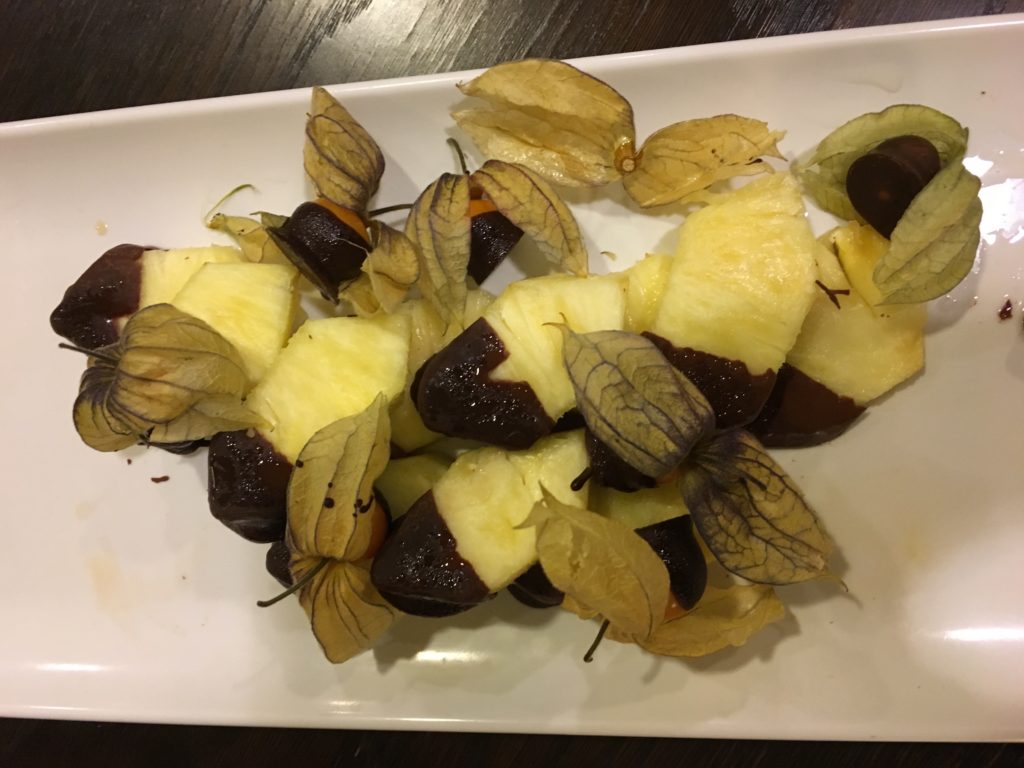
After the closing session, some people organized karaoke and a dance party. A big group of us stole the leftovers from the last Fika and pulled chairs together in the conference center hallway. I think in conferences where the conversations are so intense, activities to just let loose should be part of the options in the day or evening.
I was glad to talk more to people about the implicit bias study I hope to do. I found some wonderful people who would be interested in replicating the study in their own communities. This is wonderful news considering bias is complicated by culture and language, expertise I only have in English. I really want this study to continue in all of the Wikimedia communities. That is when the impact will be truly complete.
We wound down the day talking about implicit bias, harassment, societal pressures, gender expectations, cartoons, and insects. The hotel staff closed the conference level on us, so we had to take our conversation elsewhere. We all headed to a vegetarian buffet in Old Town Stockholm. Funny enough, we kept running into other Wikipedians and others joined us! I think this restaurant never expected such a crowd on a Sunday evening. We ended up talking until they closed and kicked us out. We moved to the hotel lobby. On the walk back to the hotel, I had a meaningful conversation about harassment with another attendee. She shared some blatant harassment she experienced, and also some of the challenges of the politics in serving higher capacities within the movement. Both issues are fueled by individual lust for power, but the actions exclude those wanting to volunteer for the greater good.
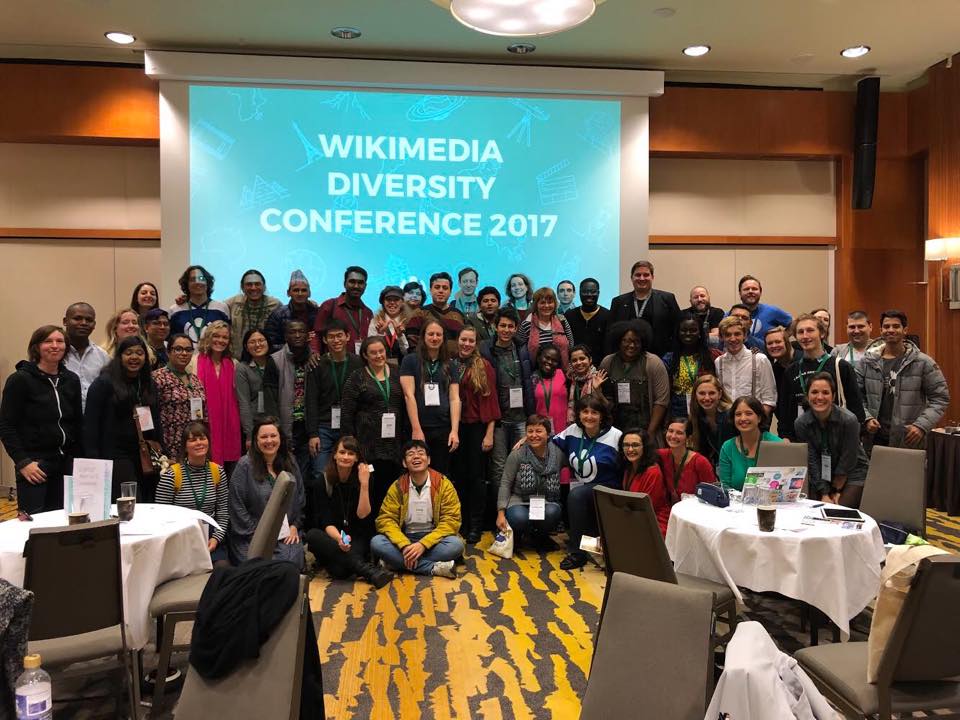
To close, we need to stop being tolerant of the poor behaviors of others. We need to enlighten those who need it. We need the WMF to step in to support marginalized communities and victimized groups, and not be scared by certain parts of the community crying out with “overreach!” because this is only serving their power and privilege further. We need to listen more, think about others more, and communicate more. Then we will have a chance at equity.
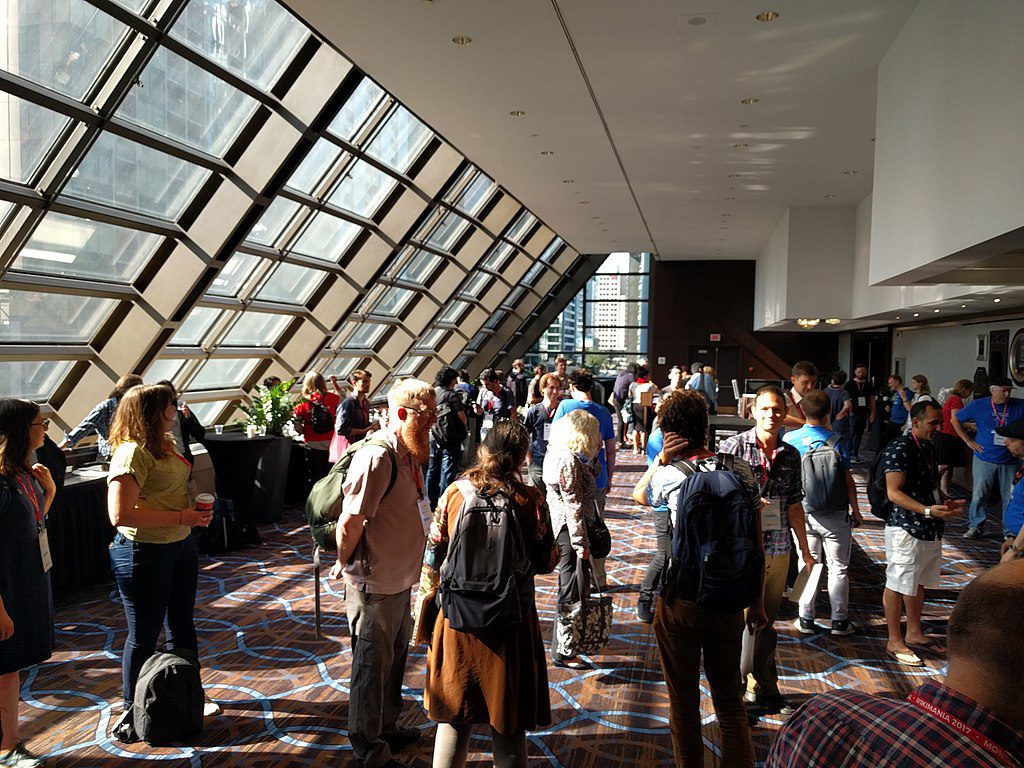
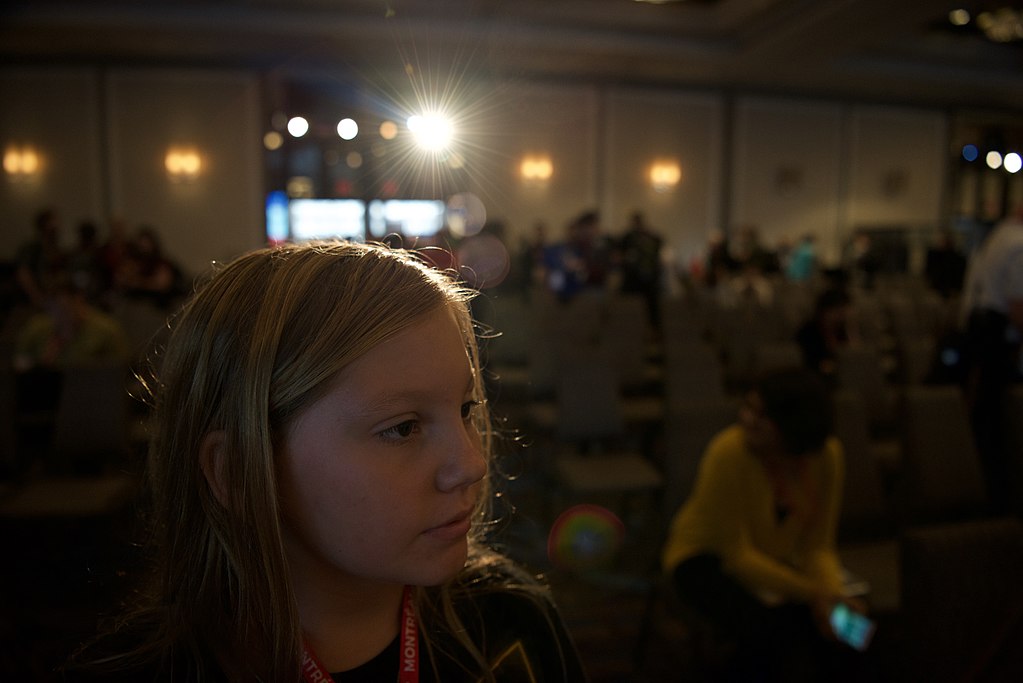
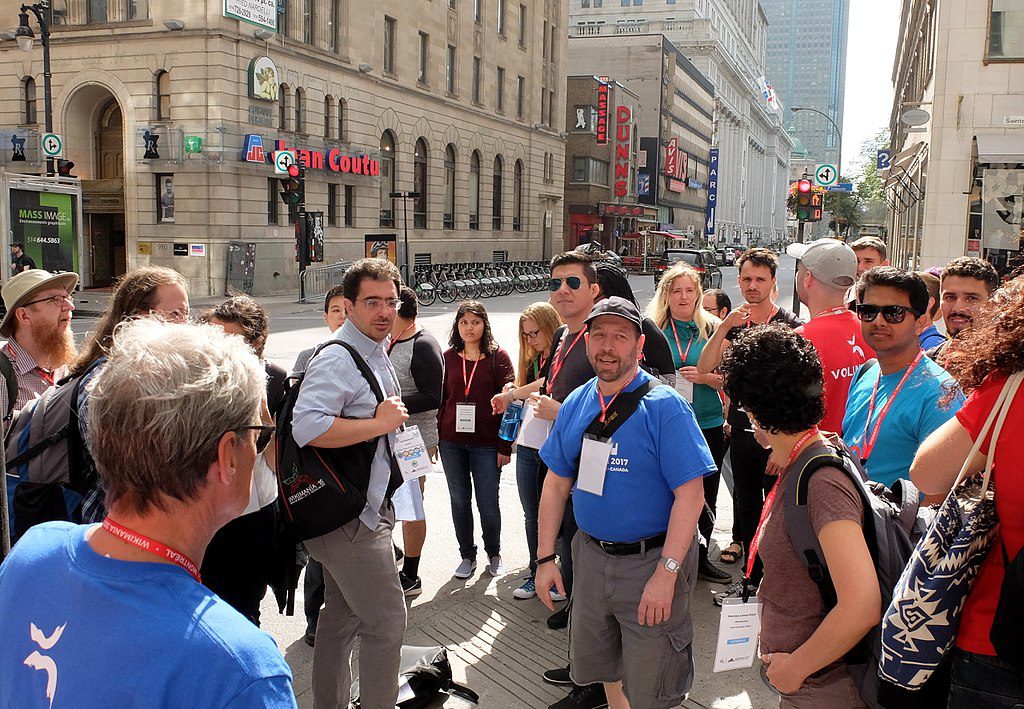
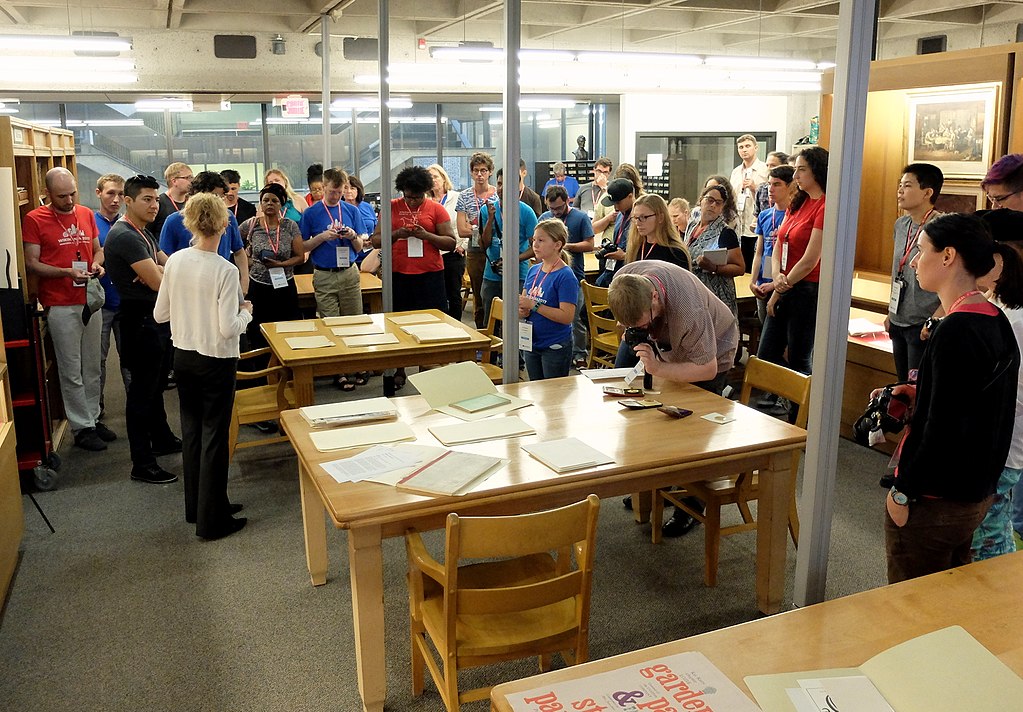
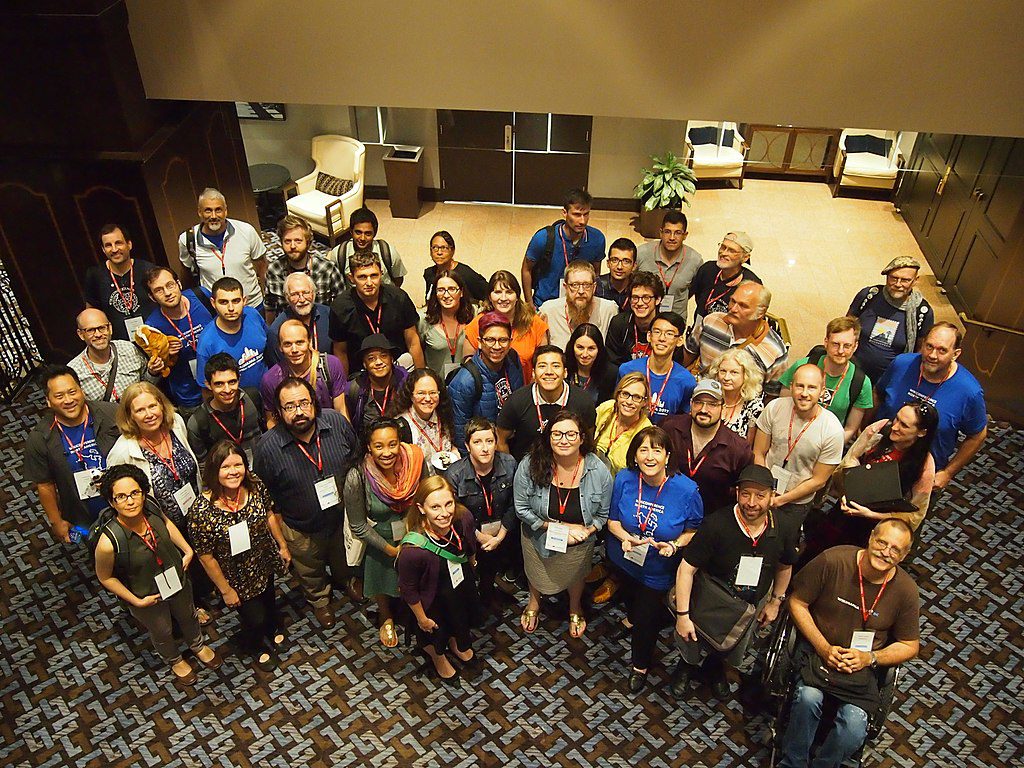
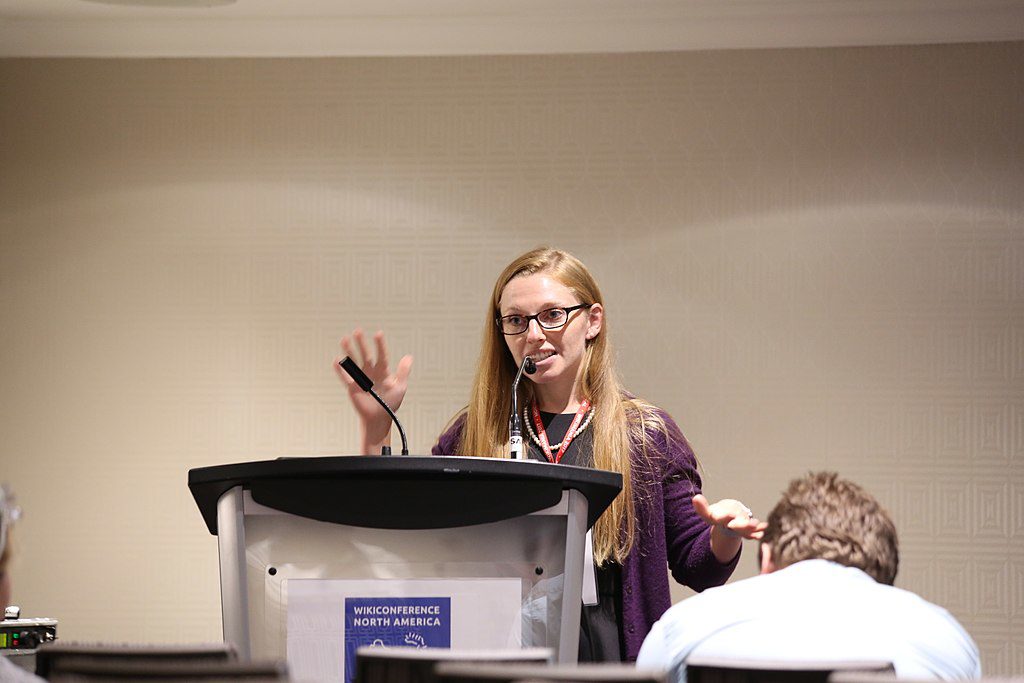
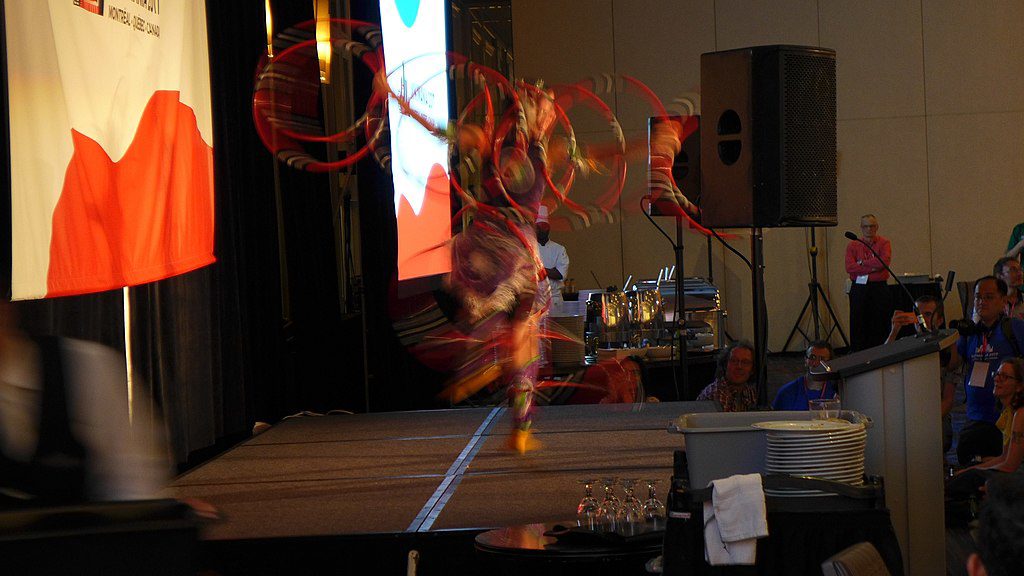
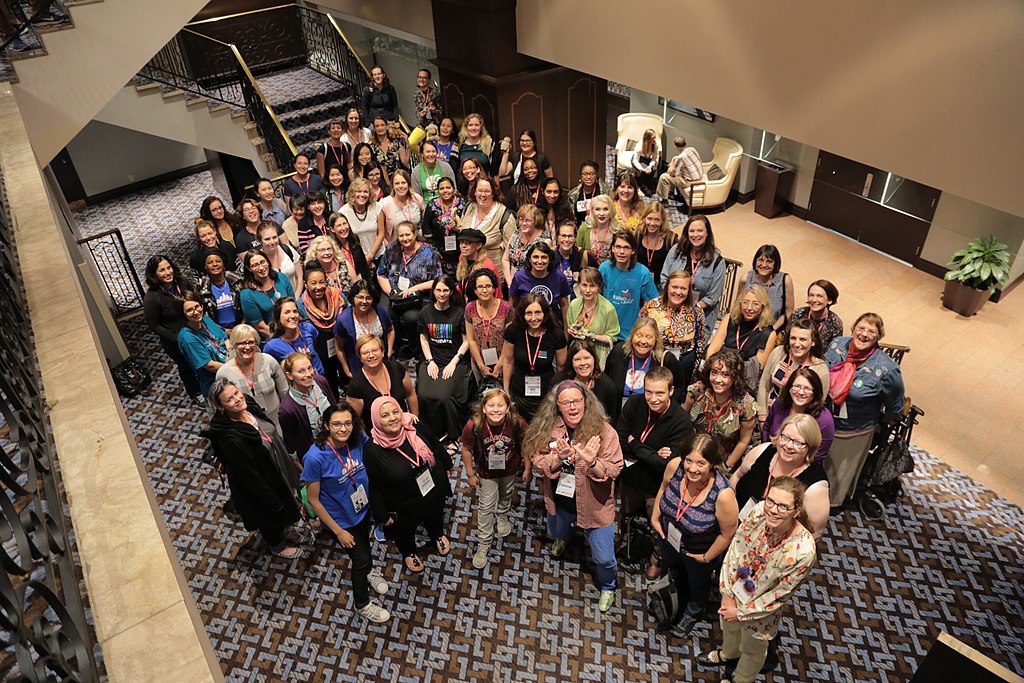
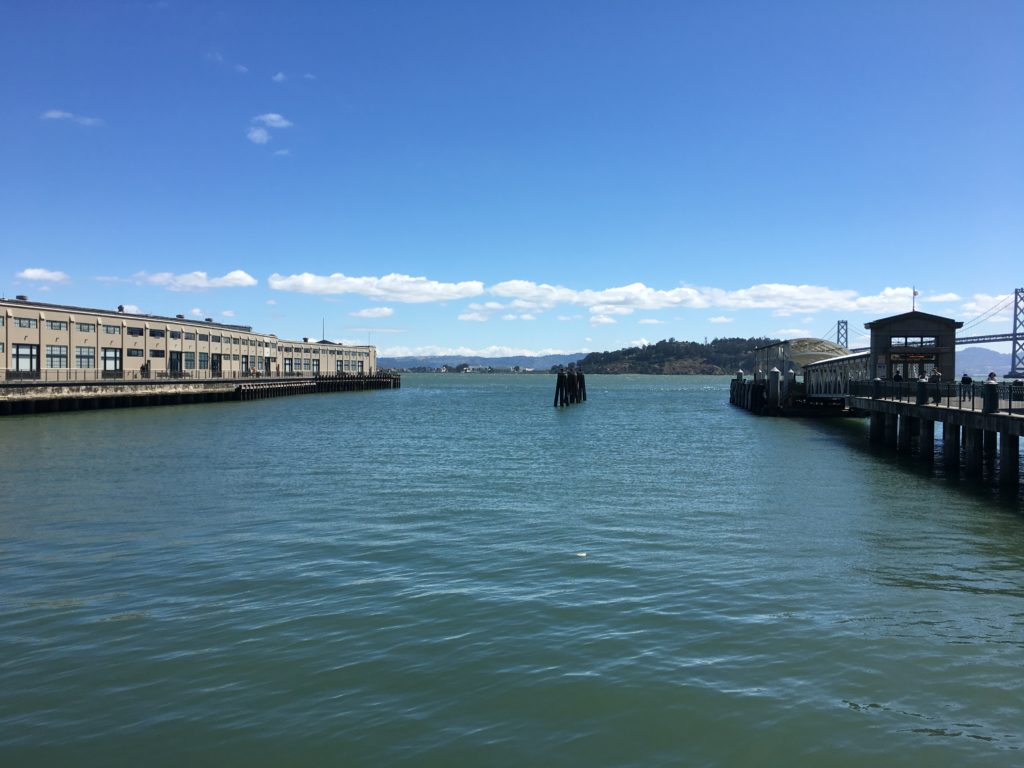
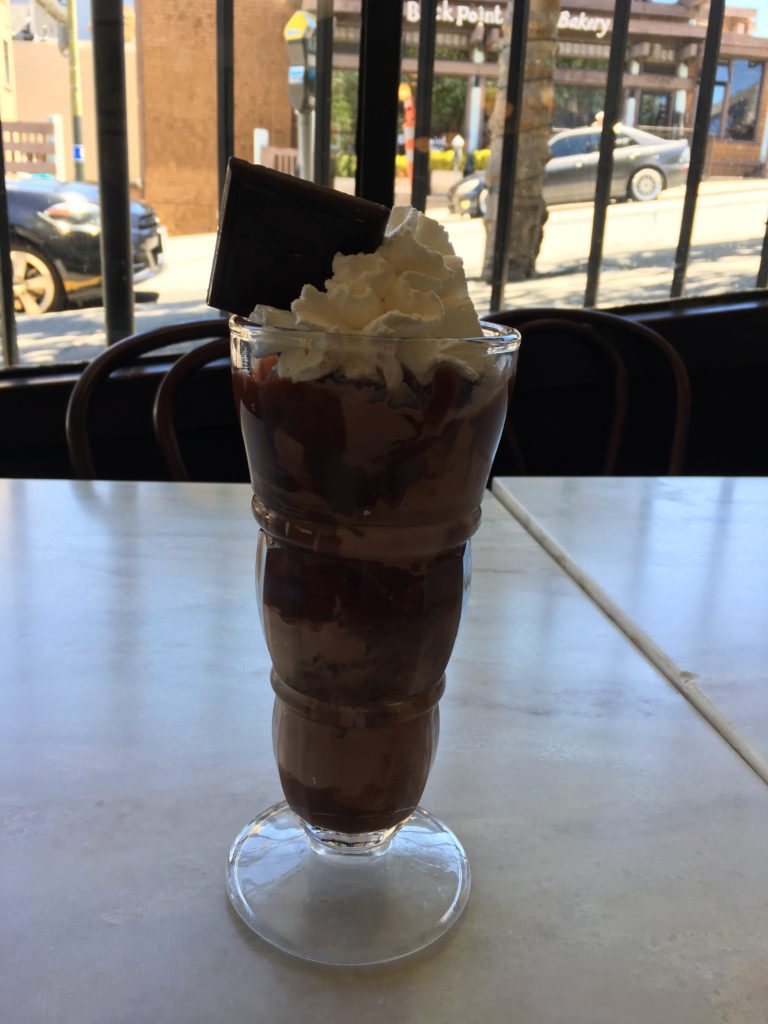 Sunday I was on my own to explore the city. My Airbnb host had incredible suggestions of the best local places to visit. I literally walked down Market Street to Embarcadero, where I had amazing views as I walked all the way up the Bay to Fishermans Wharf. There I stopped at
Sunday I was on my own to explore the city. My Airbnb host had incredible suggestions of the best local places to visit. I literally walked down Market Street to Embarcadero, where I had amazing views as I walked all the way up the Bay to Fishermans Wharf. There I stopped at 